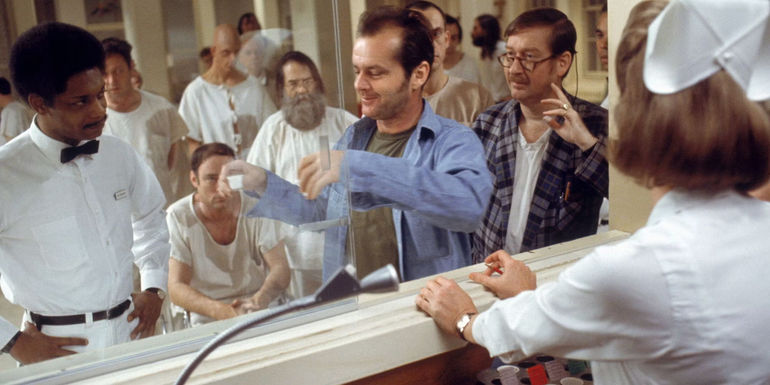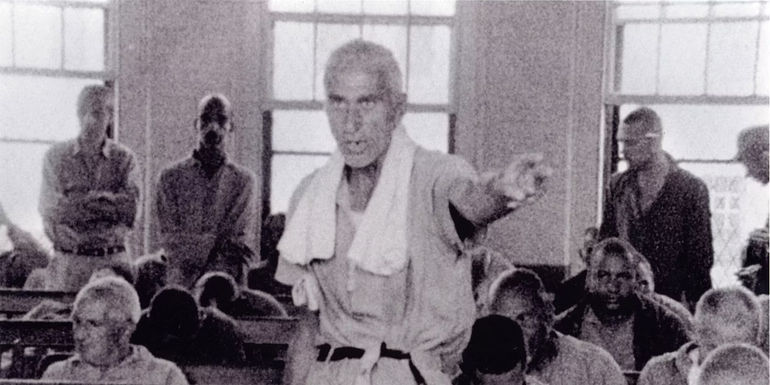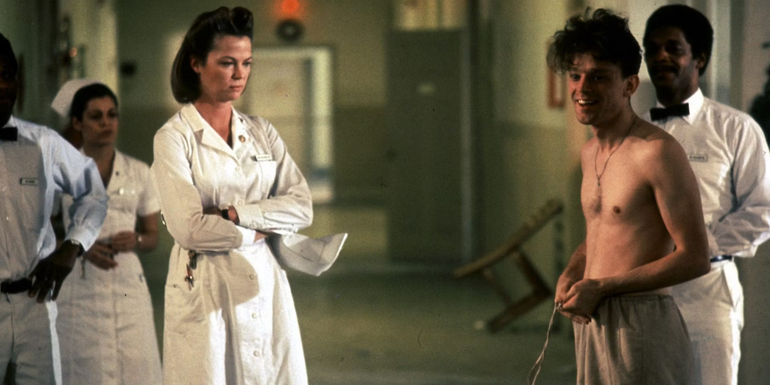
The Banned Documentary That Influenced One Flew Over the Cuckoo's Nest

Exploring the impact of Frederick Wiseman's banned documentary, Titicut Follies, on the making of One Flew Over the Cuckoo's Nest and its subsequent success at the 1976 Oscars.
The Influence of Titicut Follies on One Flew Over the Cuckoo's Nest
Milo\u0161 Forman's Oscar-winning film, One Flew Over the Cuckoo's Nest, owes a lot of its success to one banned documentary that the cast watched to prepare for their roles. Based on Ken Kesey's 1962 novel of the same name, One Flew Over the Cuckoo's Nest (1975) tells the story of Randle Patrick 'R.P.' McMurphy (Jack Nicholson), a man convicted of the statutory rape of a 15-year-old girl. In a bid to avoid jail time, R.P. pretends to be mentally ill in court and convinces the judge to send him to a mental institution instead, where he encounters the ruthless, cold-hearted tyrant Nurse Ratched (Louise Fletcher), who makes her patients' lives a living hell.
Jack Nicholson as R.P. McMurphy laughing in One Flew Over the Cuckoo's Nest.
At the 1976 Oscars, One Flew Over the Cuckoo's Nest became the second film ever to win in all five major categories: Best Picture, Best Actor, Best Actress, Best Director, and Best Adapted Screenplay. This was the first time this feat had been accomplished since It Happened One Night set the record in 1935. The plot and ending of One Flew Over the Cuckoo's Nest was also widely praised by critics for its authentic and naturalistic portrayal of patients in a mental health institution, with much of this acclaim being owed to a once-banned documentary from 1967.
Jack Nicholson and the cast of One Flew Over the Cuckoo's Nest.
To prepare for their roles as patients in a mental institution, the cast of One Flew Over the Cuckoo's Nest watched Frederick Wiseman's 1967 documentary Titicut Follies. According to Wiseman, the producers of One Flew Over the Cuckoo's Nest 'rented a print of Titicut Follies and screened it repeatedly for the cast and crew before shooting began.' Titicut Follies depicts the patient-inmates at Bridgewater State Hospital for the Criminally Insane, a state psychiatric prison-hospital in Bridgewater, Massachusetts. The documentary exposes the horrific living conditions inside the facility and the cruelty and near-torture inflicted on the patient-inmates by the staff.
A grainy, black-and-white shot of a patient-inmate in Frederick Wiseman's 1967 documentary, Titicut Follies.
The Legal Battle and Influence of Titicut Follies
It's a wonder the producers of One Flew Over the Cuckoo's Nest even got their hands on a copy of Titicut Follies, given that the documentary was banned from public viewing shortly after its release. As outlined in Carolyn Anderson & Thomas W. Benson's case history of the film's legal battle, Documentary Dilemmas: Frederick Wiseman's Titicut Follies (1991), the Massachusetts government tried to ban the public release of Titicut Follies ahead of its scheduled screening at the New York Film Festival in 1967. Though Wiseman received permission from all parties in the film, he was accused of violating patients' privacy and dignity and breaching an oral contract.
The cast of One Flew Over the Cuckoo's Nest sitting in chairs in a circle.
These claims gave the New York state government editorial control over the film. A New York state court permitted Wiseman to go ahead with the festival screening, but a year later, a Massachusetts Superior Court judge ordered that the film be recalled from distribution and all copies be destroyed for violating the patients' privacy and dignity. This case remains the only instance in which an American film was put under court-imposed restrictions and banned from public distribution in America for reasons other than obscenity, immorality, or national security.
Nursed Ratched (Louise Fletcher) looking unimpressed by a patient in One Flew Over the Cuckoo's Nest.
The Realism of One Flew Over the Cuckoo's Nest
Titicut Follies hugely influenced the naturalistic style of One Flew Over the Cuckoo's Nest, which was actually shot in Oregon State Hospital, the real mental health hospital where the events of the novel take place and the film is subsequently set. According to an interview with Michael Douglas, who served as one of the film's producers, the superintendent of Oregon State Hospital, Dr. Dean Brooks, was fully on board with the film and became quite involved (via The Guardian). Brooks even ended up playing the character of Dr. John Spivey in the film.
Nurse Ratched (Louise Fletcher) and hospital staff in One Flew Over the Cuckoo's Nest.
Douglas also shared that Brooks had assigned each actor a real patient to shadow, leading to some cast members spending the night in the hospital wards. Brooks also requested that some of his patients become part of the film crew. 'We ended up with a number of them working in different departments,' Douglas revealed. 'I didn’t realize until later that many of them were criminally insane. We had an arsonist working in the art department.' According to Forman's official website, some of the patients reportedly played extras in the film, as well.
Chief Bromden (Will Sampson) hugging R.P. McMurphy (Jack Nicholson) in One Flew Over the Cuckoo's Nest.
After a new ruling in 1991, the ban on Titicut Follies was lifted, allowing the film to be released to the public. The judge prioritized the protection of First Amendment rights, noting that the risk of violating the patient-inmates' rights to privacy and dignity was less of a concern now, since most of them had passed away (via The Washington Post). Titicut Follies aired on American television for the first time on PBS on September 4, 1992. The lift of this ban allowed fans of One Flew Over the Cuckoo's Nest to experience one of the major influences behind the acclaimed film.
Chief Bromden (Will Sampson) and R.P. McMurphy (Jack Nicholson) in One Flew Over the Cuckoo's Nest.















